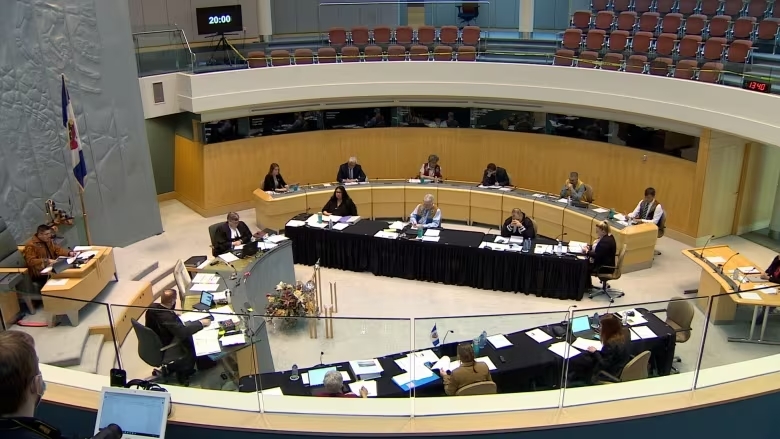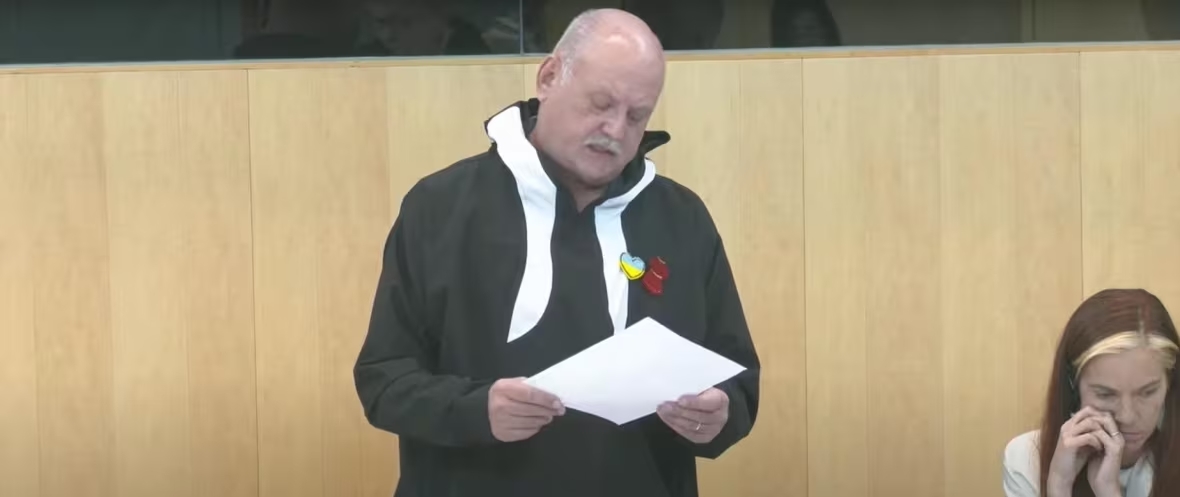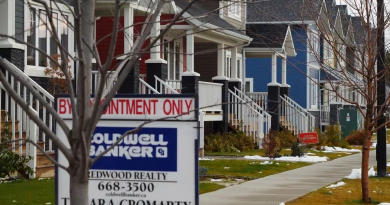MLAs ask why N.W.T. isn’t giving residents more money for evacuation costs

Some MLAs in the N.W.T. are pushing for more financial support for wildfire evacuees, but the Municipal and Community Affairs minister says that’s not going to happen — even with money coming from Ottawa to cover the wildfire response.
This summer’s wildfires dominated discussion in the legislature on Wednesday, the first day of the final sitting of the Legislative Assembly before the territorial election in November.
In her opening remarks on Wednesday, Premier Caroline Cochrane talked about the costs of the emergency response, estimating it will shrink the territory’s surplus from $178 million to $5 million.
Cochrane said the territory could find itself in deficit in the 2023-24 year after the capital expenditures.
However, she said the N.W.T. is hoping to have as much as 90 per cent of the costs of the evacuations ultimately covered by the federal government, through the federal Disaster Financial Assistance Arrangements.
During question period, Kevin O’Reilly, MLA for Frame Lake, asked why more funding won’t be provided to residents if the territory could have a significant amount of its costs reimbursed.
The territory has a few funding programs available for evacuees, including the Evacuee Income Disruption Support Program, a one-time $750 payment for those who lost over a week’s worth of income from the evacuation. There’s also the Evacuee Travel Support Program, a one-time $750 payment for those who left during an evacuation order using a vehicle and had no other financial assistance, or a one-time $400 payment to anyone who flew out after the evacuation order.
MLAs on Wednesday highlighted criticisms of the programs including the limited amount money it provides to people who were away for weeks.
But Shane Thompson, minister of Municipal and Community Affairs (MACA), said the territory isn’t considering expanding the scope of the coverage for residents as the territory has covered a large number of expenses, including the evacuation hotels, and has also donated to the United Way.
He said the federal programs the N.W.T. is applying for are not designed to serve as insurance or compensation.

Caitlin Cleveland, the MLA for Kam Lake, asked why the territory wouldn’t do more for evacuees who paid for their own flights out of Yellowknife.
“The sentiment around town was chaos and confusion,” she said of the day after the evacuation order was issued for the city.
Cleveland said many residents ended up paying for commercial flights as the government told them to, and are now being left to cover the costs.
O’Reilly said he would be pushing for more supports and also asked the territory to commit to an independent third party review of its emergency strategy.
Thompson said a review is something the government will commit to, looking at “what worked, what didn’t.” He said this will be a large undertaking that will involve those who worked on the ground in the department, as well as Indigenous governments, the federal government and others involved in the emergency response.
Thompson did say evacuees who registered with the Red Cross but still had to pay for their accommodations will be reimbursed. He encouraged them to reach out to their MLA or to MACA to do so.
MLAs also talked about preventing future fires.
Richard Edjericon, MLA for Tu Nedhé-Wiilideh, asked how the territory can help communities pay to build firebreaks.
Thompson replied that money is provided to communties by the N.W.T. Association of Communities to do FireSmart work, but that money doesn’t become available until the following year.
Thompson suggested communities FireSmart in advance, and then get reimbursed for the work the following year.
Yellowknife’s evacuation
Rylund Johnson, MLA for Yellowknife North, asked how the decision was made to evacuate Yellowknife.
Thompson said the territory had to consider all the options, including the aggressive fire behaviour and the limited options for people to leave.
“Ultimately the right decision was made,” Thompson said.
He said there was a risk of two threatening wildfires merging and cutting off the highway out of town. If that happened, he said the air quality would deteriorate and the airport would no longer be a viable option for people to get out.
Thompson said at the time the decision was made, the government figured residents had about 48 hours to leave based on the fire’s behaviour.
He said the city had requested assistance with its shelter-in-place plan, but “that wasn’t a viable option.”
Wednesday’s session also saw MLAs pay tribute to Adam Yeadon, a 25-year-old firefighter from Fort Liard who died on the job in July.
In opening remarks, numerous members gave their condolences to the friends and family of Yeadon.
“Adam was passionate about his work as a firefighter,” said Cochrane.
Related stories from around the North:
Canada: MLAs in N.W.T. look to postpone election amid wildfires, evacuations, CBC News
Norway: Smoke from Canadian wildfires forecast to reach Norway, The Associated Press
Russia: New NOAA report finds vast Siberian wildfires linked to Arctic warming, The Associated Press
United States: Wildfires in Anchorage? Climate change sparks disaster fears, The Associated Press



